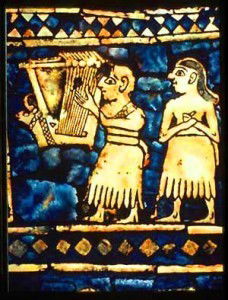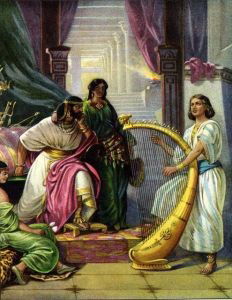Why We Should be Grateful for God's Gift of Music

Before we talk about Gratitude, the giving of Thanks, or any other similar word, we must be sure that we know what we’re talking about. Here is a definition that includes the essential element to Thankfulness. “In general terms, gratitude stems from the recognition that something good happened to you, accompanied by an appraisal that someone, whether another individual or an impersonal source, such as nature or a divine entity, was responsible for it,” explain researchers Lúzie Fofonka Cunha, Lucia Campos Pellanda, and Caroline Tozzi Reppold in a 2019 article published in the journal Frontiers in Psychology.
This definition includes an OBJECT of gratitude, a person or impersonal source. Many of the other definitions that I encountered only used such words as “feeling”, “emotion”, or a vague “response”, but to no-one in particular. In simplest terms, Gratitude is an acknowledgement that someone has done something good for you. It may or may not be accompanied by a positive emotion. In Romans 12:20, 21, the Bible tells Christians, “Therefore if thine enemy hunger, feed him; if he thirst, give him drink: for in so doing thou shalt heap coals of fire on his head. Be not overcome of evil, but overcome evil with good.” If someone does something good for you and he is your enemy, your emotional response may not be positive, but you must, nevertheless, be grateful.
Ultimately, thanksgiving /gratitude must be given to God, because He is, after all, the Creator of all things good. You may also recognize the vehicles through which He transfers all that goodness – family, friends, community, etc.
Having said that, we can begin the body of the article.
- God has given humanity a profound and melodic expression of His love – music. From the very beginning, the Bible speaks of God creating the world through His spoken word. In Genesis, we read, "And God said, 'Let there be light,' and there was light" (Genesis 1:3, NIV). God's creative power is inherently linked to sound, as in His voice, and expression, the way it is put together. Music, as a harmonious arrangement of sounds, mirrors the divine harmony present in the very fabric of creation. Some anthropologists suggest that people sang before they used non-tonal speech. Even now, the Jewish rabbis sing the scripture during worship services. Perhaps God sang His creation commands.

- In Genesis 4:21 we learn about the first musician. The scripture says “His (Jabal’s) brother’s name was Jubal; he was the father of all who play stringed instruments and pipes.” I can imagine him sitting around, fiddling (pun intended) with an archer’s bow, twanging the string, making it longer and shorter and experimenting with the sounds it made. I can also imagine him listening to the wind in some broken reeds making different sounds and combining them into a crude pan pipe.
By doing such things, he was also demonstrating that music is a science as well as an art. He may have inadvertently discovered the Overtone Series, a mathematical formula embedded in the way a string behaves when it is struck or plucked. When a string vibrates, it sets up a wave along its entire length. It also sets up two waves at exactly half its length; three waves along exactly one third of its length; four waves at one fourth its length, etc. Please see the short sidebar about the Overtone Series at the end of the article. - Music can be a way through which we express our adoration and reverence for the Almighty. Often, the first thing that people think about when they hear the word “worship” is the singing and playing of music. Although it’s not the only definition (such a discussion would take another whole article), it’s one of the most profoundly obvious and beautiful ways to worship God.

The Bible has many references to music as a means of praise and worship. One of my favorites is in Psalm 150:3-5, where David declares, "Praise him with the sounding of the trumpet, praise him with the harp and lyre, praise him with timbrel and dancing, praise him with the strings and pipe, praise him with the clash of cymbals, praise him with resounding cymbals."

- While investigating the instruments in this Psalm, I discovered that the word translated as “lyre” could also be a type of bagpipe. The word doesn’t refer to the sound the instrument makes, but, rather to its shape. Although bagpipes are currently associated with Scotland and surrounding areas, most archeologists and music historians believe that they originated in the Middle East, where the Psalms were written, and later introduced into the area of Scotland some time before the 14th century.
- Beyond its role in formal worship, music has the power to stir our emotions and uplift our spirits. In times of joy, we may find ourselves singing praises to God, and in moments of sorrow, soothing melodies can bring comfort. The Christian journey is often accompanied by trials and tribulations, and music becomes a source of solace, reminding us of God's unwavering presence and love.

- A number of times, the Bible highlights the transformative power of music. In 1 Samuel 16:23 (NIV), we learn that David played the lyre for Saul, and the distressing spirit that troubled Saul departed. Elisha, the prophet, called for a musician to create an atmosphere for God to work miracles (2 Kings 3:15). Singers and musicians even went before the Hebrew army as they went out to battle. (II Chronicles 20:21) These biblical narratives underscore the spiritual power embedded in the music that God uses and that resonate with His design.
- One of the most important things that is recorded about those musicians that were assigned to worship God in the Temple was the fact that they were expected to be highly skilled. Such a feat is not accomplished by hit and miss learning, practice and rehearsal on the part of the musician. Unfortunately, many musicians, not just those involved in musical worship at their church or synagogue, do not treat the great gift of God with the respect that it deserves. Such a skill must be nurtured well in order for it to come to its full fruition. Otherwise, it’s a slap in God’s face to only sing or play what comes naturally. That natural inclination is the seed; it needs watered and tended to properly grow.
- Music transcends cultural and linguistic barriers, making it a powerful tool for spreading the message of Christ. Contemporary Christian music, hymns, and gospel songs have the ability to touch the hearts of individuals who may not be receptive to traditional forms of evangelism. Through the universal language of melody, we can share the redemptive story of Jesus Christ, inviting others to experience the transformative power of His love.
- One of the ways that God shows His infinite creativity is through music. Not only are there a myriad number of ways to arrange a particular melody, and other music theory techniques, but the vast array of legitimate music styles that are used throughout the world to worship God. Every culture and sub-culture in which Christians and Jews live has its own taste in music and that is often reflected in the way that they worship. Also, many congregations use an assortment of music styles from the past that further enlarges their pool of musical ways to worship.
- Everyone, not just Christians, is called to be grateful for the divine gift of music. It is not merely an art form but a profound expression of our connection with the Creator. Through music, we can praise and worship God, find emotional and spiritual solace, and contribute to the diversity that reflects the beauty of His creation. Let us, therefore, approach the melodies of life with gratitude, recognizing the symphony that resonates with the heart of our loving God.
In Romans 1:20, it says, “For since the creation of the world God’s invisible qualities—his eternal power and divine nature—have been clearly seen, being understood from what has been made, so that people are without excuse.” Music is one of those invisible qualities, made known to people through the songs of birds and dolphins, and through the natural occurrence of the Overtone Series.
Even more interesting is that the Overtone Series is a reflection of the Fibonacci Sequence, a series of numbers that are found in the design of certain seashells and the line loss in a power line. It looks like this – 1+1=2, 1+2=3, 2+3=5, 3+5=8, etc. Therefore, the Fibonacci ratios are 1:1, 2:3, 3:5, 5:8 and 8:13.
Because of all of the interlocking evidence, it is impossible of any human or set of humans to have invented such interrelated numerical patterns; it would have taken a mind infinitely greater than that of a mere mortal. Once someone is made aware of such marvelous patterns, that person is now responsible for either accepting or rejecting the gifts of the Creator, including His loving salvation, and music.
A gift requires a response on the part of the receiver of that gift. Sometimes, the response is sheer indifference, expressed by a lack of recognition that the gift was even given. Sometimes, the receiver acknowledges the gift, but, clearly or subtly, expresses the feeling that the gift is not appreciated. This is most obvious if the gift is “re-gifted”, lost or returned to the store. The best response, of course, is utter and complete gratitude, especially wehen it is given by One who totally knows the receiver of the gift. If you have received the gift of music, I exhort and encourage you to make the most of it. Return it to the Giver of all good gifts, with your life and your time.

Side Bar about the Overtone Series
The scale, notes and chords we use weren’t invented by anyone. The notes we use come from a mathematical formula imbedded in the way a string behaves when it is struck or plucked. When a string vibrates, it sets up a wave along its entire length. It also sets up two waves at exactly half its length; three waves along exactly one third of its length; four waves at one fourth its length, etc. There is a point at which the string doesn’t set up any more waves, depending on its length and thickness, but the human ear can’t detect any notes created by the waves at one sixth or seventh of the string’s length.
The notes created by these waves are the ones that are in the chromatic scale. Without getting too technical, if you held down the “loud” pedal on a piano and hit a low C, you would also hear the C above that, the G above that, then the next C, the E, the next G, the A and the B-flat. You may have noticed that all of those notes are found in common variations of a C chord. If you tried all of the notes on the piano, you would only find the notes in the chromatic scale, nothing in between.
When the harpsichord and other early keyboards were invented, they reflected those notes in the black and white keys. Even before that, when music was written for Gregorian chants, all they ever used were those notes.
People discovered the way God had created the musical scales. We have modified, rearranged and tinkered with scales, but we could only use what God had created for us.
Salt Cellar Creations understands the beauty and power that music can convey and has a growing library of original works and arrangements, secular and Christian, all done for the glory of God (soli Deo gloria). Explore the offerings HERE.
SCC can also compose an original piece for you or do a custom arrangement for you. There are two ways that this can be done; one is much more affordable than the other. And SCC is always looking for ideas of pieces to arrange or suggestions for original pieces.
We have sold music not only in the US but in Canada, the United Kingdom, France, Australia, Austria, New Zealand, and Germany. Please visit the WEBSITE or CONTACT US to let us know what we can do for you!